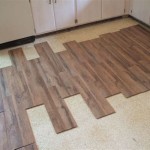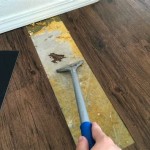Linoleum Flooring On Stairs: A Comprehensive Guide
Linoleum, a durable and versatile material, is an excellent choice for flooring, including stairs. This guide will delve into the key aspects of linoleum flooring for stairs, providing valuable information to make informed decisions.
Material and Construction
Linoleum is made from natural materials such as linseed oil, wood flour, cork dust, and pigments. Its construction involves a backing layer, a print layer for the design, and a clear top layer that protects the flooring from wear and tear. Linoleum is known for its durability, resistance to fading, and sound-dampening properties.
Stair Tread Options
Linoleum flooring for stairs can be installed as treads or planks. Treads are pre-cut pieces designed to fit the dimensions of each step. Planks, on the other hand, require cutting and fitting to the specific shape of the stairs. Both options provide a seamless and consistent appearance.
Installation Methods
Linoleum stair treads can be secured using adhesive or a combination of nails and adhesive. Adhesive provides a strong and long-lasting bond, while nails offer additional stability. The installation process involves preparing the stairs, applying the adhesive or nails, and fitting the treads securely.
Maintenance and Care
Linoleum flooring is relatively easy to clean and maintain. Regular sweeping or vacuuming removes loose dirt and debris. For deeper cleaning, use a damp mop or cloth with a mild detergent solution. Avoid harsh chemicals or abrasive cleaners that may damage the floor's surface.
Design Considerations
Linoleum flooring offers a wide range of colors, patterns, and textures. This versatility allows for customization to match any interior design style. Linoleum can imitate the look of natural materials such as wood or stone, providing a sophisticated and elegant touch to the stairs.
Additional Benefits
In addition to its durability and ease of maintenance, linoleum flooring on stairs offers several other benefits:
- Antibacterial and antimicrobial: Linoleum's natural properties inhibit the growth of bacteria and mold, making it a hygienic choice for homes with pets or children.
- Fire resistance: Linoleum is naturally fire resistant, providing an added layer of safety in the event of a fire.
- Sustainable: Linoleum is made from renewable resources, making it an eco-friendly flooring option.
Conclusion
Linoleum flooring on stairs offers a combination of durability, style, and functionality. Its natural materials, wide range of design options, ease of installation, and low maintenance requirements make it an excellent choice for any home. By following the guidelines outlined in this guide, you can achieve a beautiful and long-lasting flooring solution for your stairs.

How To Install Vinyl Plank Flooring On Stairs In 6 Steps Inc

Installing Linoleum On Stairs

Pros And Cons Of Installing Vinyl Flooring On Stairs

Pros And Cons Of Installing Vinyl Flooring On Stairs Lx Hausys

Pros And Cons Of Installing Vinyl Flooring On Stairs

Vinyl Flooring On Stairs Complete Guide

Pros And Cons Of Installing Vinyl Flooring On Stairs Lx Hausys

How To Install Vinyl Plank Flooring On Stairs In 6 Steps Inc

Luxury Vinyl Tile Seamless Upstairs And Downstairs Solution

How To Install Luxury Vinyl Plank Laminate Flooring On Stairs
Related Posts








